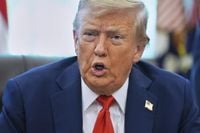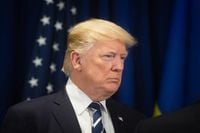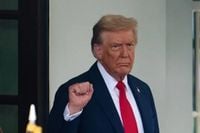On August 24, 2025, President Donald Trump unleashed a barrage of criticism against major television networks ABC and NBC, igniting a fresh firestorm over media bias, freedom of the press, and the role of federal regulators. In a flurry of posts on his Truth Social platform, Trump accused both networks of being “two of the worst and most biased networks in history,” insisting that their coverage of his administration was overwhelmingly negative—"97% BAD STORIES," in his words. The president’s demands were clear: he called for the Federal Communications Commission (FCC) to revoke the networks’ broadcast licenses, arguing that their reporting constituted a direct threat to American democracy.
Trump’s posts, which quickly reverberated across the media and political landscape, were uncompromising in tone. “Despite a very high popularity and, according to many, among the greatest 8 months in Presidential History, ABC & NBC FAKE NEWS, two of the worst and most biased networks in history, give me 97% BAD STORIES,” he wrote, as reported by multiple outlets including TNND and Benzinga. “IF THAT IS THE CASE, THEY ARE SIMPLY AN ARM OF THE DEMOCRAT PARTY AND SHOULD, ACCORDING TO MANY, HAVE THEIR LICENSES REVOKED BY THE FCC. I would be totally in favor of that because they are so biased and untruthful, an actual threat to our Democracy!!!”
In subsequent posts, Trump intensified his criticism, questioning the networks’ financial obligations. “Why is it that ABC and NBC FAKE NEWS, two of the absolute worst and most biased networks anywhere in the World, aren’t paying Millions of Dollars a year in LICENSE FEES,” he demanded. He argued that, at a minimum, the networks should “pay up BIG for having the privilege of using the most valuable airwaves anywhere at anytime!!!” According to APA and Mezha, Trump insisted that “crooked ‘journalism’ should not be rewarded, it should be terminated!!!”
Trump’s attack was not limited to accusations of bias. He claimed that ABC and NBC “allegedly spread ‘fake news’” and did not adhere to licensing rules, as reported by Mezha. He further asserted that the networks’ reporting was not just unfair to him personally, but to Republicans and conservatives more broadly, stating, “They should lose their Licenses for their unfair coverage of Republicans and/or Conservatives.”
These comments come against a backdrop of escalating tensions between Trump and the mainstream media. The president has long accused prominent outlets of harboring a liberal bias and acting as “an arm of the Democratic Party.” He has regularly used his social media platform to lambast journalists and news organizations he perceives as hostile, but his latest calls for FCC intervention mark an escalation in rhetoric—and have revived heated debates about the boundaries of government power over the press.
It’s worth noting, as TNND and Benzinga point out, that the FCC does not actually issue licenses to networks such as ABC and NBC. Instead, the independent agency grants eight-year licenses to individual local broadcast stations that may be affiliates of these networks. Past FCC chairs, including Jessica Rosenworcel and Ajit Pai, have previously pushed back on Trump’s calls for revoking licenses based on content, citing First Amendment protections. Rosenworcel and Pai have made it clear that such actions would violate constitutional rights to free speech and a free press.
Despite these legal and procedural realities, the current FCC chair, Brendan Carr, has signaled a more sympathetic stance toward Trump’s concerns. In May, Carr told CNBC, “TV stations have a lot of trust, and so the agenda that I’m trying to run at the FCC is to empower those actual local television stations to serve the public interest. What we’ve seen is that national news media, ABC, NBC, CBS, and they’re exercising more and more control over those local TV stations. I don’t think that’s a good thing for the country, so we’re trying to reverse it.” Carr’s comments have fueled speculation that federal regulators could take a more aggressive approach to network oversight, especially if political winds shift further in Trump’s favor.
The president’s recent posts also referenced a string of legal battles and public disputes with major media outlets. Earlier this summer, Trump celebrated a $16 million settlement with CBS over its 2024 60 Minutes interview with Vice President Kamala Harris, a deal that was swiftly followed by FCC approval of parent company Paramount’s $8 billion merger with Skydance. Trump also sued CBS News in October 2024, alleging that an edit of a 60 Minutes episode with Harris was deceptive and intended to paint the vice president in a favorable light. These legal skirmishes, combined with Trump’s public attacks, have heightened concerns among critics that the president is using both the courts and regulatory agencies to shape the media environment to his advantage.
Trump’s criticisms extended beyond ABC and NBC. In July 2025, he celebrated the cancellation of Stephen Colbert’s Late Show on CBS, calling the host “talentless” in another Truth Social post. He also mocked the August rebranding of MSNBC to “MS Now,” posting, “MSNBC IS A FAILURE BY ANY NAME!” as reported by Benzinga. These remarks underscore Trump’s broader campaign against what he sees as a hostile and unaccountable media establishment.
Not everyone in Washington agrees with Trump’s approach. Legal experts and press freedom advocates have warned that attempts to punish networks for unfavorable coverage threaten the foundational principles of American democracy. The First Amendment, after all, was designed to protect the press from government interference—even, and perhaps especially, when that press is critical of those in power. “Unfair ‘journalism’ should not be rewarded; it should be stopped!!!” Trump insisted, but many in the legal community argue that the remedy for bias is more speech, not government censorship.
The president’s posts also referenced his popularity, boasting that, “according to many,” his administration had delivered “the greatest 8 months in Presidential History.” He claimed that ABC and NBC’s coverage was so negative as to be out of step with public sentiment, suggesting a coordinated effort to undermine his presidency. “They are so biased and untruthful that they pose a real threat to our democracy!!!” he declared, as reported by Mezha and Mediaite.
Trump’s attacks on the networks came just hours after he criticized former New Jersey governor Chris Christie, who had appeared on ABC’s This Week to discuss the FBI’s raid on ex-national security advisor John Bolton. Trump responded by floating the idea of reopening the notorious 2013 “Bridgegate” investigation involving Christie’s aides, a move widely interpreted as political retaliation.
As the debate rages on, the practical implications of Trump’s demands remain uncertain. While the FCC’s authority over individual stations is clear, its power to punish entire networks for editorial decisions is sharply limited by legal precedent and constitutional protections. Still, Trump’s rhetoric has injected fresh urgency into ongoing discussions about the future of media regulation, the boundaries of presidential power, and the health of American democracy itself.
For now, ABC and NBC have not issued formal responses to the president’s latest attacks. But with the 2026 election cycle already heating up, few expect the battle between Trump and the mainstream media to cool down anytime soon. The stakes, both for the press and for the public, could hardly be higher.



